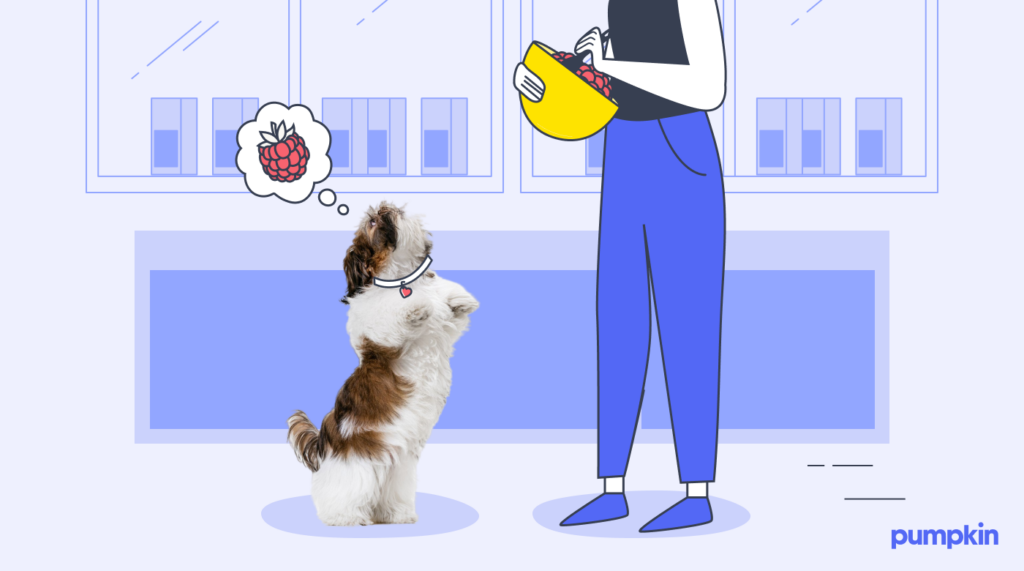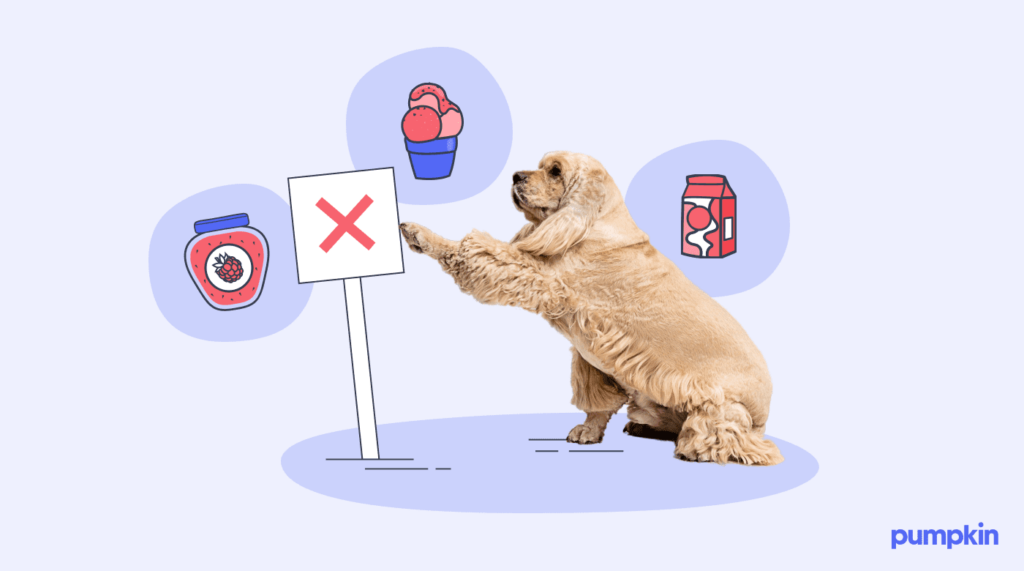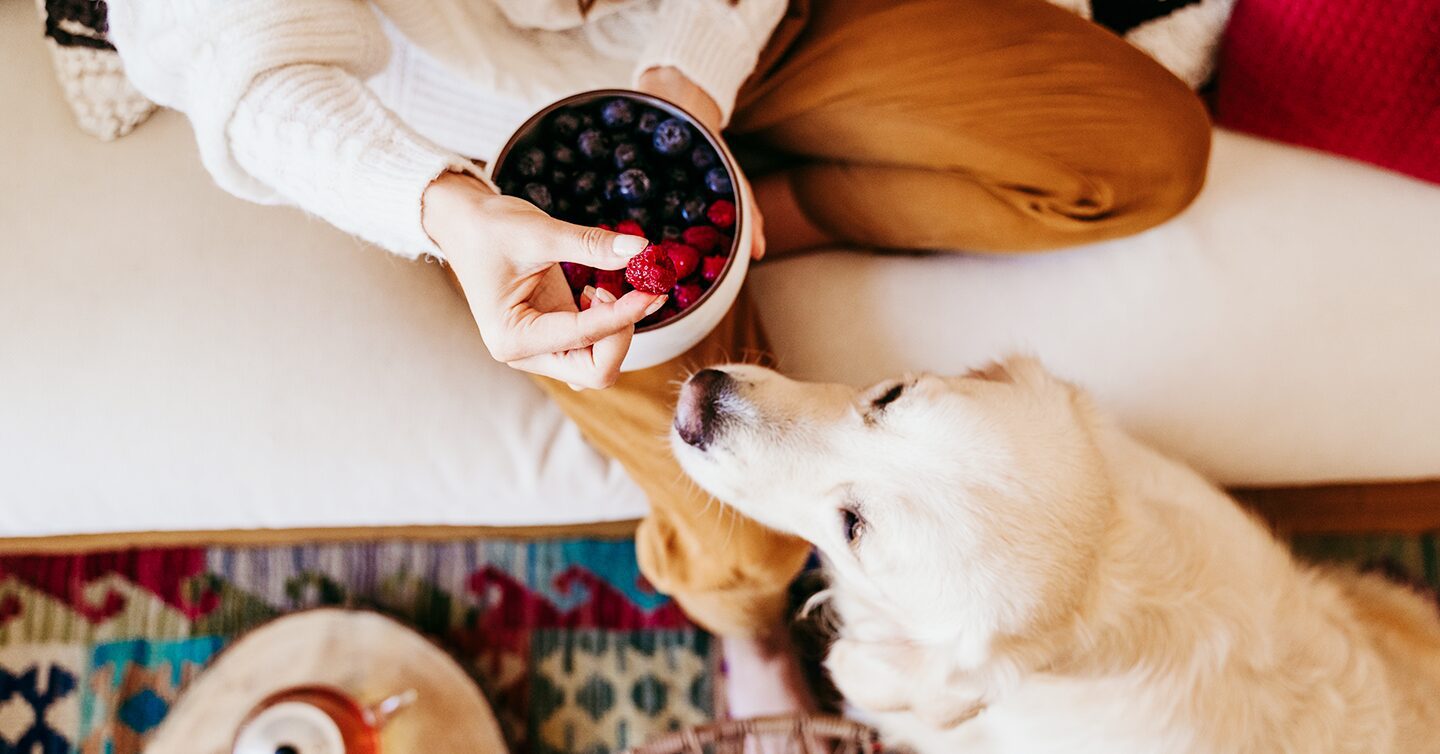Key Points:
- Yes, dogs can eat raspberries, but no more than a small handful (or fewer for small dogs).
- Raspberries contain fiber, manganese, and vitamins C and K — all of which can benefit your dog’s health.
- Too many raspberries can lead to diarrhea in dogs due to high fiber content.
Picture this: It’s a sunny summer day. As you tuck into a delicious fruit salad, your dog waits expectantly by your side, tempting you to toss a ripe, juicy raspberry their way. Here’s the good news: Feeding your dog a raspberry or two is perfectly safe and can even have some health benefits.
Dogs can eat raspberries in moderation, but keep in mind that sweet fruits (however tasty) can upset your pup’s stomach if they consume too much. Of course, you can’t always control what your dog eats when you’re not looking — so if you have a fruit bowl burglar at home, be prepared for a potentially messy aftermath.
The bulk of your dog’s diet should include vet-recommended dog food and meaty treats — think of any safe human foods as an occasional bonus. And as far as bonuses go, a few raspberries offer quite the nutritional boost. Keep reading for a closer look at the nutritional benefits of raspberries, and some safe ways to share them with your dog.
The health benefits of raspberries for dogs
Much like their fellow superfoods — blackberries, blueberries, and strawberries — raspberries are a human food that is safe for dogs to eat. While dogs should get all their nutrients from their daily dog food, an occasional raspberry can add a burst of nutritional value — as long as they’re eaten in moderation.
Let’s take a closer look at the nutritional value of raspberries, and how these nutrients can supplement your dog’s regular diet.
Antioxidants: Raspberries are packed with antioxidants, which have anti-inflammatory properties and can also boost your dog’s immune system.
Dietary fiber: Studies have shown that a diet rich in fiber can lower your dog’s risk of diarrhea, constipation, and even obesity. Just remember: Berries are also full of sugar, which has the opposite effect on your dog’s digestive system.

Vitamin K: This vitamin helps regulate blood calcium levels, boosts bone health, and lowers the risk of heart disease in dogs.
B-complex vitamins: These vitamins help regulate your dog’s metabolism, nervous system, and heart function, with the added benefit of improved coat health.
Trace minerals: Raspberries hold trace amounts of manganese, magnesium, copper, potassium, and iron. These minerals support your dog’s bones, muscles, and vital systems.
Tip: Senior dogs can especially benefit from antioxidants in their diets. Antioxidants reduce inflammation in sore joints, slow the growth of arthritis, and can stem the effects of aging on their brains, protecting them against cognitive aging, or doggy dementia.
Possible risks of feeding raspberries to dogs

Raspberries contain natural xylitol, a chemical compound that’s toxic to dogs. Xylitol is commonly used as an artificial sweetener, but it also occurs naturally in some fruits and vegetables.
Before you swear off the fruit entirely, know that raspberries contain a minuscule amount of xylitol. The compound becomes dangerous for dogs only when it appears in the concentrated levels found in processed foods. To put this in perspective, a 22-pound dog would need to eat 32 cups of raspberries to ingest a life-threatening amount of xylitol.
If your dog eats a couple of cups of raspberries (which is still a lot for a mid-sized dog), you can expect some diarrhea or vomiting, but not a severe reaction. However, small dog breeds and puppies can be more susceptible to reactions from xylitol, so it’s best to stay aware of the potential risk.
A sugar overload can cause your dog similar digestive woes. Sure, the ancestors of domesticated dogs ate berries — but the berries we buy in stores today are much sweeter than their wild predecessors, and contain more sugar than most dogs can comfortably handle. Small dog breeds and puppies are also more sensitive to sugar.
The bottom line? Moderation is key.
How many raspberries can a dog eat?
How many raspberries your dog can eat at one time largely depends on the size of your canine friend. How much your dog will eat, however, comes down to how motivated they are to steal your fruit salad.
- For very small dogs (20 pounds and under) and puppies, stick to only one to two raspberries at a time.
- Small dogs under 30 pounds can handle three to four raspberries.
- Medium dogs over 30 pounds can have a serving of five or six berries.
- Larger dogs (over 50 pounds) can safely consume a small handful of raspberries.

Are wild raspberries safe?
Wild raspberries are safe for dogs to eat. But it’s important to be careful when foraging with your furry friend, because some of the raspberry look-alikes you’ll find are toxic.
As a matter of fact, there are a number of berries in the wild that’ll give your dog nothing but trouble. These include:
- Holly berries: These festive, red fruits are known to induce nausea and stomach cramps.
- Jerusalem cherries: A relative of the deadly nightshade plant, these orange-red orbs are poisonous for humans and dogs alike.
- Pokeweed berries: Don’t let your dog chew on the vibrant pink stem or the deep purple berries, as every part of the plant is poisonous.
- Yew berries: Bright red in color, the seeds in these potentially lethal berries have been found to cause seizures.
Always be careful picking and eating wild berries of any type. You might pick a poisonous one by accident, thinking it’s safe for your pup. When in doubt, the wisest thing to do is to simply avoid giving wild berries to your dog. It’s a lot safer to share raspberries that are sold in supermarkets.
Preparation do’s and don’ts
Before feeding raspberries to dogs, keep these tips in mind:
Do feed your dog raspberries in a variety of ways — fresh, frozen, whole, smashed, or even mixed into a smoothie or dog treat that includes other safe ingredients. (The internet is full of creative recipes.)
Do feed them to your dog by hand, add one or two as a garnish atop their dinner bowl, or blend them into a puree
Do thoroughly wash raspberries before feeding them to your dog. Washing your produce removes any outside contaminants like dirt or small insects and reduces the likelihood that you or your dog will contract a food-borne illness.
Don’t forget to smash the berries or cut them into pieces, especially for smaller dogs and puppies.
Don’t give your dog raspberries with added ingredients. Examples include sugar-coated raspberries, chocolate-covered berries, or raspberries covered in dressing from a salad.
Beware of food products with raspberries
It’s one thing to give raspberries to your dog. It’s another when raspberries are just one component in a recipe that may contain other harmful ingredients.

Most supermarkets carry food products that contain raspberries. Though these treats might seem harmless to feed your dog, be careful since they might cause problems.
Renowned pet chef Rocky Kanaka recommends you avoid giving the following raspberry-based foods to your four-legged buddy:
- Raspberry jam and raspberry jelly: These tend to have excessive amounts of sugar, and sugar-free varieties may contain xylitol, an artificial sweetener that’s toxic to dogs.
- Raspberry preserves: These are made with a sugary syrup which isn’t safe for your pup.
- Raspberry yogurt: Your dog may end up with an upset tummy after eating this sugary snack.
- Black raspberry ice cream: This treat’s cream, milk, and sugar content don’t bode well for your dog’s stomach.
Puppies and raspberries
Wondering if your young pup can eat these fruits?
To put it simply: Yes, puppies can eat raspberries, too. What you need to consider is the delicate nature of their stomachs. Sensitive tummies are common among puppies, which means that puppy parents need to be extra aware of the food they offer their pets.
As with adult dogs, puppies should be fed raspberries in moderation. While they’re a sweet addition to a meal or safe little daytime snack, they should never be a meal.
Other fruits dogs can eat
While raspberries offer many health benefits to your dog, they’re not the only snacking option out there. You can make your dog’s diet more colorful by adding a variety of nutritious fruits.
After all, dogs are omnivores, which means that fruits and vegetables go well alongside meats. In addition to raspberries, you can add these fruits to your dog’s snack rotation:
Blueberries: This well-known member of the berry family is packed with antioxidants and vitamins. Just be aware that they can pose a choking hazard, especially if your dog gets overly excited during snack time. Consider mashing them up before giving them to your dog, and always serve them in moderation.
Strawberries: Strawberries contain no toxic substances for your canine friend. Though, since they can be large, you may want to consider cutting them up to make them safer for consumption, especially if your dog is a smaller breed.
Apples: Apples can keep the (veterinary) doctor away by providing plenty of vitamins A and C as well as fiber. Be mindful, though: Apple seeds contain cyanide, so it’s best to remove them when giving your pup an apple snack.
Bananas: The potassium and fiber content of bananas isn’t just beneficial to humans — it’s great for dogs, too. Just make sure your dog doesn’t chow down on the banana peel, which is tough to digest.
Oranges: This classic citrus treat is filled with vitamin C and fiber. However, oranges are also rich in sugar, which can lead to unwelcome stomach problems and eventual weight gain. So, like most doggy snacks, feed them in moderation.
The final word on feeding your dog raspberries
Raspberries can be delicious, healthy treats for your dog as long as they’re eaten in moderation. Raspberries have many health benefits: anti-inflammatory properties, digestion-aiding fiber, and an array of important vitamins and minerals. However, too many raspberries may upset your dog’s digestive system, leading to an upset stomach, constipation, or diarrhea.
The food your dog eats directly affects their health in a number of ways. That’s why it’s important for dog parents to understand the risks and benefits of experimenting with new foods — especially human foods — before feeding them to their pooch. As always, be sure to consult your vet before making any changes to your dog’s diet.
As careful as you might be when giving your canine companion yummy snacks, accidents can still happen that lead to hefty vet bills. Pet insurance can help you be prepared to face the unexpected with your pooch — learn more about Pumpkin Pet Insurance plans.
FAQs: Can dogs eat raspberries?
- Red raspberries: Nutrition facts, benefits, and more. (2023, July 3). Healthline. https://www.healthline.com/nutrition/raspberry-nutrition#antioxidants
- 10 tasty wild berries to try (and 8 poisonous ones to avoid). (2023, February 10). Healthline. https://www.healthline.com/nutrition/wild-berries#8-Poisonous-wild-berries-to-avoid
- Can dogs eat raspberries or should dog owners keep this fruit for themselves? (n.d.). Rocky Kanaka. https://rockykanaka.com/can-dogs-eat-raspberries/
- What fruits can dogs eat? (n.d.) Purina. https://www.purina.co.uk/articles/dogs/feeding/guides/what-fruits-can-dogs-eat
- Dietary fiber aids in the management of canine and feline gastrointestinal disease. (2022, October 26). American Veterinary Medical Association Publications. https://avmajournals.avma.org/view/journals/javma/260/S3/javma.22.08.0351.xml




